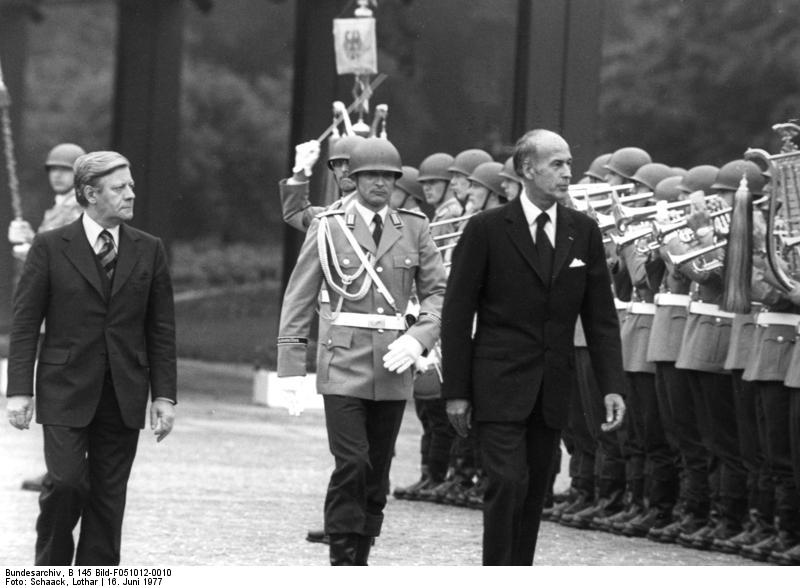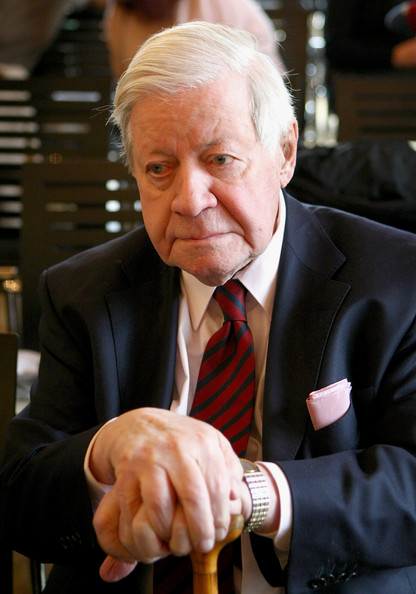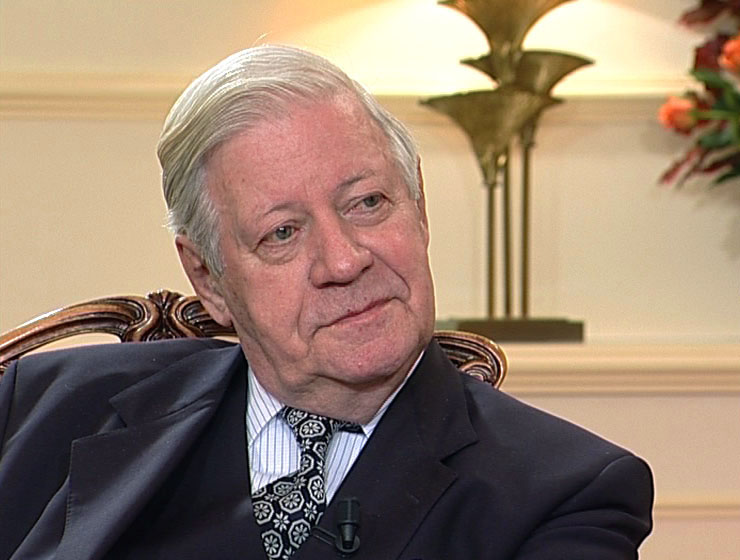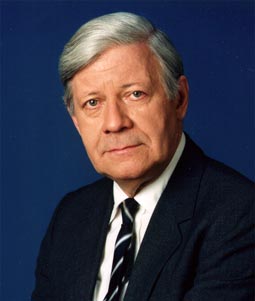<Back to Index>
- Inventor Wilhelm Bauer, 1822
- Poet Martin Opitz von Boberfeld, 1597
- Chancellor of Germany Helmut Heinrich Waldemar Schmidt, 1918
PAGE SPONSOR
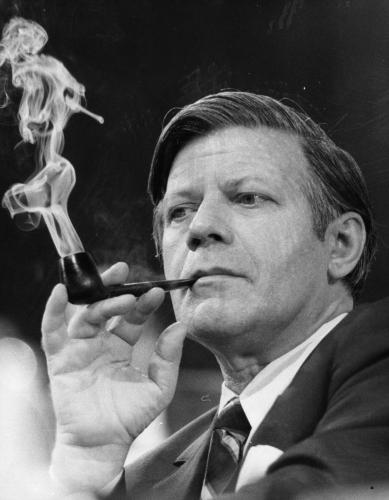
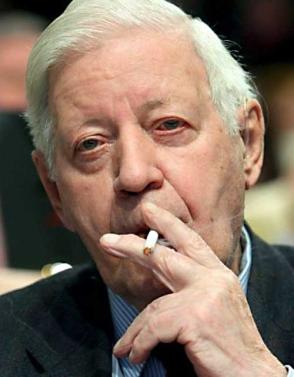
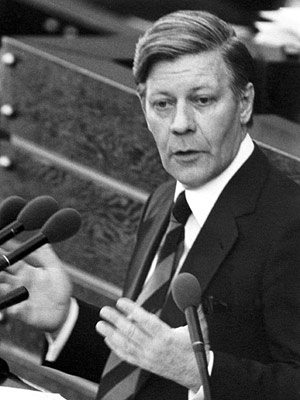
Helmut Heinrich Waldemar Schmidt (born 23 December 1918) is a German Social Democratic politician who served as Chancellor of West Germany from 1974 to 1982. Prior to becoming chancellor, he had served as Minister of Defence and Minister of Finance. He had also served briefly as Minister of Economics and as acting Foreign Minister. He is the oldest surviving German Chancellor and the last surviving person to have been solely Chancellor of West Germany (Helmut Kohl was Chancellor of both West Germany and reunified Germany). He also is the oldest Federal German Minister surviving after the death of his Interior Minister Werner Maihofer.
Helmut Schmidt was born in Hamburg, as son of two teachers. He studied at Hamburg Lichtwark school, graduating in 1937. He was conscripted into military service and began serving with an anti-aircraft battery at Vegesack near Bremen during World War II. After brief service on the eastern front he returned to Germany in 1942 to work as a trainer and advisor at the Reichsluftfahrtministerium. Also in 1942, on 27 June, he married his childhood sweetheart Hannelore "Loki" Glaser (3 March 1919 – 21 October 2010), with whom he fathered two children: Helmut Walter (26 June 1944 – February 1945, died of meningitis), and Susanne (b. 1947), who works in London for Bloomberg Television. Toward the end of the war, from December 1944 onwards, he served as Oberleutnant in the artillery on the western front. He was captured by the British in April 1945 on Lüneburg Heath and was a prisoner of war until August. During his service in World War II Schmidt was awarded the Iron Cross.
Schmidt's father was the illegitimate son of a Jewish businessman, although this was kept secret in the family. This was confirmed publicly by Helmut Schmidt in 1984, after Valéry Giscard d'Estaing had, apparently with Schmidt's assent, revealed the fact to journalists. Schmidt himself is a non-practicing Lutheran.
Schmidt completed his education in Hamburg, studying economics and political science. He graduated in 1949. Schmidt had joined the Social Democratic Party (SPD) in 1946, and from 1947 to 1948 was leader of the Sozialistischer Deutscher Studentenbund, the then student organisation of the SPD. Upon
leaving the university, he worked for the government of the city state
of Hamburg, working in the department of economic policy. Beginning in
1952, under Karl Schiller, he was a senior figure in the Behörde für Wirtschaft und Verkehr (the Hamburg State Ministry for Economy and Transport). He was elected to the Bundestag in
1953, and in 1957 he became member of the SPD parliamentary party
executive. A vocal critic of conservative government policy, his
outspoken rhetoric in parliament earned him the nickname
"Schmidt - Schnauze". In 1958, he joined the national board of the SPD (Bundesvorstand) and campaigned against nuclear weapons and the equipping of the Bundeswehr with such devices. In 1958, he gave up his seat in parliament to concentrate on his tasks in Hamburg. From 27 February 1958, to 29 November 1961, he was a Member of the European Parliament, which was not directly elected at the time. The government of the city-state of Hamburg is known as the Senate, and from 1961 to 1965 Schmidt was the Innensenator, that is Minister of the Interior. He gained the reputation as a Macher (doer) –
someone who gets things done regardless of obstacles – by his effective management during the emergency caused by the 1962 flood.
Schmidt used all means at his disposal to alleviate the situation, even
when that meant overstepping his legal authority, including federal police and army units (ignoring the German constitution's prohibition on using the army for "internal affairs"; a clause
excluding disasters was not added until 1968). Describing his actions,
Schmidt said, "I have not been put in charge of these units; I have
taken charge of them!" This
characteristic was coupled with a pragmatic attitude and opposition to
political idealism, including those of student protests, best symbolised by his well known remark that "People who have a vision
should go see a doctor." In 1965, he was re-elected to the Bundestag.
In 1967, after the formation of the Grand Coalition between SPD and
CDU, he became chairman of the Social Democrat parliamentary party, a
post he held until the elections of 1969. In 1967, he was elected deputy party chairman. In October 1969, he entered the government of Willy Brandt as defence minister. During his term in in office the military conscription time was reduced from 18 to 15 months. Additionally, Schmidt decided to introduce the Bundeswehr universities in Hamburg and Munich to broaden the academic education of the German officer corps. In July 1972, he succeeded Karl Schiller as
Minister for Economics and Finances, but in November 1972, he
relinquished the Economics department, which was again made a separate
ministry. Schmidt remained Minister of Finances until May 1974. From 1968 to 1984, Schmidt was deputy chairman of the SPD (unlike Willy Brandt and Gerhard Schröder, he was never actually chairman of the party). He became Chancellor of West Germany on 16 May 1974, after Brandt's resignation in the wake of an espionage scandal.
The worldwide economic recession was the main concern of his
administration, and Schmidt took a tough and disciplined line. During
his term, Germany had to cope with the oil crisis of the 1970s;
according to some judgments, Germany managed better than most of
the industrial states. Schmidt was also active in improving relations
with France. Together with the French President Valéry Giscard d'Estaing, he was one of the fathers of the world economic summits, the first of which assembled in 1975. In 1975, he was a signatory of the Helsinki Final Act to create the Conference for Security and Co-operation in Europe, the precursor of today's OSCE. He remained chancellor after the 1976 elections in coalition with the FDP. Regarding the terrorist Red Army Faction he held a tough, no compromise line. Specifically, he authorized the GSG 9 anti-terrorist unit to end the hijacking of the Lufthansa aircraft Landshut by force in the German Autumn of 1977. During his tenure as chancellor Schmidt drew criticism from Israel for commenting that Palestine should receive an apology because the Holocaust of European Jewry seemingly prompted the establishment of the State of Israel. Concerned about the Soviet invasion of Afghanistan and the Soviet superiority regarding missiles in Central Europe, Schmidt issued proposals resulting in the NATO Double-Track Decision concerning
the deployment of medium range nuclear missiles in Western Europe
should the Soviets not disarm. He was re-elected as chancellor in
November 1980. In October 1981, Schmidt was fitted with a cardiac pacemaker. At the beginning of his period as Bundeskanzler, Schmidt was a proponent of Keynesian economics,
and pursued expansionary monetary and fiscal policies during his time
as chancellor. Between 1979 and 1982, the Schmidt Administration
pursued such policies in an effort to reduce unemployment. These were
moderately successful, as the fiscal measures introduced after 1977,
with reductions in income and wealth taxes and an increase in the
medium term public investment programme, were estimated to have created
160,000 additional jobs in 1978-79 (or 300,000 if additional public
sector employment was included in the figure).
The small fall of the unemployment rate, however, was achieved at the cost
of a larger budget deficit (which rose from 31.2 billion DM to 75.7
billion DM in 1981), brought about by fiscal expansion. By the end of his term, Schmidt had turned away from deficit spending.
Large sections of the SPD increasingly opposed his security policy
while most of the FDP politicians strongly supported that policy; while
representatives of the left wing of the Social Democratic Party opposed
reduction of the state expenditures, the FDP began proposing a monetarist economic policy. In February 1982, Schmidt won a Motion of Confidence,
however on 17 September 1982, the coalition broke apart, with the four
FDP ministers leaving his cabinet. Schmidt continued to head a minority
government composed only of SPD members, while the FDP negotiated a
coalition with the CDU/CSU. During this time Schmidt also headed the
Ministry of Foreign Affairs. On 1 October 1982, parliament approved of a Vote of No-Confidence and elected the CDU chairman Helmut Kohl as
the new Chancellor. This was the first and only time in the history of
the Federal Republic that a Chancellor was ousted from office in this
way. Although
Schmidt did not feel that he was in a position to substantially extend
the social reforms of the Brandt Administration, due to the economic
problems he encountered during his time as chancellor, a wide range of
reforms were nevertheless carried out under his administration. These
included: In 1982, along with his friend Gerald Ford, he co-founded the annual AEI World Forum. In 1983, he joined the nationwide weekly Die Zeit newspaper as co-publisher. In 1985, he became Managing Director. With Takeo Fukuda he founded the Inter Action Councils in 1983. He retired from the Bundestag in 1986. In December 1986, he was one of the founders of the committee supporting the EMU and the creation of the European Central Bank. Contrary to the current line of his party, Helmut Schmidt is a determined opponent of Turkey's entry into the EU. He also opposes phasing out nuclear energy, something that the Red - Green coalition of Gerhard Schröder supported. Schmidt
is the author of numerous books on his political life, on foreign policy
and political ethics. He remains one the most renowned political
publicists in Germany. In recent years, Schmidt has been afflicted with increasing deafness.
In November 2007, Schmidt wrote in the German weekly Die Zeit that the United States was a greater threat to world peace than Russia. He argued that Russia had not invaded its neighbors since the conclusion of the Cold War and that he was surprised that Russia allowed Ukraine and other former components of the Soviet Union to secede peacefully. He noted that the United States' invasion of Iraq under George W. Bush was "a war of choice, not a war of necessity."
Schmidt numbered the assassinated Egyptian president Anwar as-Sadat among his particular friends from the world of politics, and sustains his friendship with ex-president Valéry Giscard d'Estaing of France. His circle also includes former US Secretary of State Henry Kissinger who
is on record as stating that he wishes to predecease Helmut Schmidt,
because he would not wish to live in a world without Schmidt.
